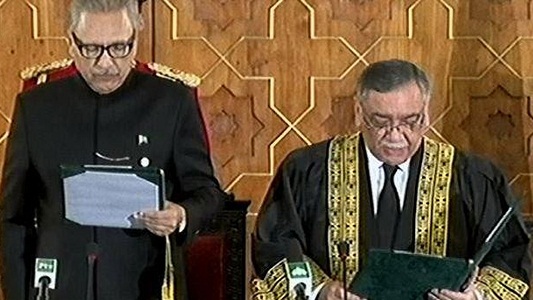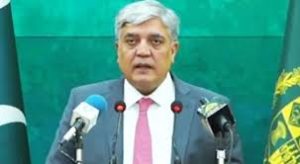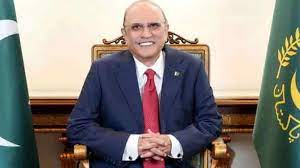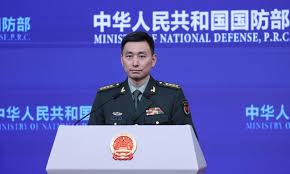Justice Khosa takes oath as CJ

Islamabad: Justice Asif Saeed Khosa took oath as the 26th Chief Justice of Pakistan at a ceremony at Aiwan-e-Sadr in Islamabad on Friday. President Dr Arif Alvi administered the oath to him. The ceremony was attended among others by Prime Minister Imran Khan, Senate Chairman, Speaker National Assembly, members of the federal cabinet, parliamentarians, services chiefs and serving and retired judges of the Supreme Court and lawyers. Several foreign dignitaries belonging to law and justice field also attended the ceremony. Justice Asif Saeed Khosa brings with him a vast experience in the law and justice field. He has decided about 55000 cases during his 19 years of career so far. Justice Asif Saeed Khosa received his undergraduate and masters degrees from University of Punjab and his LL.M degree from Queens’ college at Cambridge in 1978. He enrolled as an advocate at the Lahore High Court in 1979 and then at the Supreme Court in 1985. Justice Khosa was elevated to the position of a Supreme Court Judge on February 18, 2010. The new Chief Justice of Pakistan in his address on the occasion of full court reference held in honour of former Chief Justice of PakistanMian Saqib Nisar in Islamabad yesterday announced his course of action with focus on revamping the judiciary and attending the causes that contribute towards delay in disposition of cases at all levels of judicial hierarchy. He particularly expressed the determination to resolve the issues like frivolous litigation, fake witnesses, false testimonies, to what he said “retiring the debt of pending cases at the earliest possible”. Justice Asif Saeed Khosa said, “I would like to assure you that all such steps will be taken in the best interests of the institution of judiciary and that in all manner of circumstances we shall like and prefer to be correct rather than erratic and proper rather than popular”. He reminded the participants of the reference that there are about 1.9 million cases pending in the different courts of the country while there are only three thousand Judges and Magistrates available from top to bottom to handle such a huge backlog. Justice Khosa said now it’s time to take some big and hard decisions with introduction of some structural and systematic changes to minimize litigation, eliminate unnecessary delays and rationalize the workload. He said four-tier judicial hierarchy in the country ought to be replaced with a three-tier system wherein there should be the District Judiciary as the trial court for all civil and criminal cases, the Provincial High Courts as the courts of appeal in all cases and the Supreme Court as the last resort. He said all questions of fact must attain finality at the level of the High Court and the Supreme Court ought to attend only to interpretation of Constitution and Laws.





